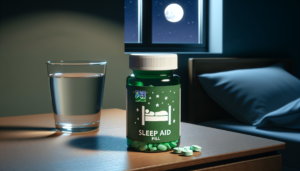Natural Sleep Aid: Tips for Better Rest
Quality Sleep and the Power of Natural Sleep Aids
Prioritizing good sleep enhances cognitive function, emotional balance, and physical resilience. Research shows that people who consistently get sufficient rest perform better, stay focused longer, and manage stress more effectively.
Unfortunately, chronic sleep deprivation is linked to serious health conditions like heart disease, diabetes, obesity, and mental health disorders. This is where a natural sleep aid can make a difference. Natural sleep aids support the body’s ability to fall asleep and stay asleep—without the side effects of synthetic alternatives.
By understanding the importance of rest and incorporating a trusted natural sleep aid into your nightly routine, you can enjoy deeper, more restorative sleep and a healthier, more balanced life.
Tips for Better Rest: Unlocking the Power of Quality Sleep
In our nonstop world, sleep often takes a backseat—but quality rest is essential for physical health, mental clarity, and emotional balance. True rest is not just about closing your eyes; it’s a biological necessity that helps your body repair, your brain process memories, and your immune system stay strong.
Following proven tips for better rest can dramatically improve your well-being. From establishing a consistent sleep schedule to creating a calming bedtime routine, small changes can lead to big improvements in how you feel and function each day.
Lack of sleep has been linked to serious health risks such as obesity, diabetes, heart disease, and depression. Fortunately, incorporating natural sleep strategies and supplements can help you fall asleep faster, stay asleep longer, and wake up refreshed.
By embracing simple, effective tips for better rest, you can enhance your sleep quality—and your quality of life.
Key Takeaways
- Quality sleep is essential for overall health and well-being, impacting physical, mental, and emotional health.
- Common sleep disorders such as insomnia, sleep apnea, and restless leg syndrome can significantly impact sleep quality and overall health.
- Natural sleep aids like melatonin, valerian root, and chamomile can help improve sleep quality and promote relaxation.
- Lifestyle changes such as establishing a regular sleep schedule, reducing screen time before bed, and exercising regularly can improve sleep quality.
- Relaxation techniques like deep breathing, meditation, and progressive muscle relaxation can help reduce stress and promote better sleep.
Common Sleep Disorders
Sleep disorders are a widespread issue, affecting millions of people globally. ### Insomnia: The Struggle to Fall Asleep or Stay Asleep Insomnia is one of the most common sleep disorders, characterized by difficulty falling asleep or staying asleep. This can be caused by various factors such as stress, anxiety, or underlying medical conditions. ### The Consequences of Sleep Disorders Individuals with insomnia find themselves feeling fatigued during the day, leading to decreased productivity and irritability. Another prevalent sleep disorder is sleep apnea, a condition where breathing repeatedly stops and starts during sleep. This can lead to fragmented sleep and reduced oxygen levels in the body, resulting in excessive daytime sleepiness and increased risk of cardiovascular issues. ### Other Sleep Disorders and the Importance of Recognition Other disorders include restless leg syndrome (RLS), which causes uncomfortable sensations in the legs and an irresistible urge to move them, and narcolepsy, characterized by excessive daytime sleepiness and sudden sleep attacks. Recognizing these disorders is the first step toward seeking appropriate treatment and improving sleep quality.
Natural Sleep Aids

For those struggling with sleep issues, natural sleep aids can offer a gentle alternative to over-the-counter medications. Melatonin is one of the most well-known natural supplements for promoting sleep. This hormone regulates the sleep-wake cycle and can be particularly helpful for individuals experiencing jet lag or shift work-related sleep disturbances.
Taking melatonin supplements may help signal to your body that it’s time to wind down and prepare for rest. Another popular natural sleep aid is valerian root, an herbal remedy that has been used for centuries to promote relaxation and improve sleep quality. Valerian root is believed to increase levels of gamma-aminobutyric acid (GABA) in the brain, which helps calm the nervous system.
Additionally, chamomile tea is often recommended for its soothing properties; sipping on a warm cup before bed can create a calming bedtime ritual that signals your body it’s time to relax. These natural aids can be effective tools in your quest for better sleep when used responsibly.
Lifestyle Changes for Better Sleep
| Lifestyle Changes | Effect on Sleep |
|---|---|
| Regular Exercise | Improves sleep quality and duration |
| Healthy Diet | Reduces sleep disturbances |
| Limiting Caffeine and Alcohol | Promotes better sleep patterns |
| Establishing a Bedtime Routine | Helps signal the body for sleep |
| Creating a Comfortable Sleep Environment | Enhances overall sleep quality |
Making simple lifestyle changes can have a profound impact on your sleep quality. One of the most effective changes is establishing a consistent sleep schedule. Going to bed and waking up at the same time every day helps regulate your body’s internal clock, making it easier to fall asleep and wake up feeling refreshed.
This consistency reinforces your body’s natural rhythms and can significantly improve your overall sleep quality. In addition to maintaining a regular schedule, it’s essential to evaluate your daily habits. Limiting caffeine intake in the afternoon and evening can help prevent disruptions in your ability to fall asleep.
Engaging in regular physical activity is another beneficial lifestyle change; exercise promotes better sleep by reducing stress and anxiety levels while also helping you fall asleep faster. However, it’s important to avoid vigorous workouts close to bedtime, as they may have the opposite effect. By making these lifestyle adjustments, you can create a foundation for improved sleep.
Relaxation Techniques for Better Sleep
Incorporating relaxation techniques into your nightly routine can significantly enhance your ability to fall asleep peacefully. Mindfulness meditation is one such technique that encourages you to focus on the present moment while letting go of racing thoughts and worries. Practicing mindfulness before bed can help calm your mind and prepare you for restful slumber.
Deep breathing exercises are another effective way to promote relaxation.
By taking slow, deep breaths, you activate your body’s relaxation response, which can help reduce tension and anxiety.
Progressive muscle relaxation is also beneficial; this technique involves tensing and then relaxing each muscle group in your body systematically.
By focusing on releasing tension in your muscles, you can create a sense of calm that makes it easier to drift off to sleep. Integrating these relaxation techniques into your bedtime routine can transform your approach to sleep.
Creating a Sleep-Friendly Environment

Optimize Your Bedroom Conditions
To create a sleep-friendly space, start by ensuring your bedroom is dark, quiet, and cool. Darkness signals to your body that it’s time to produce melatonin, while a cool temperature helps facilitate better sleep by lowering your body’s core temperature.
Invest in Comfortable Bedding
Investing in comfortable bedding is also essential for promoting restful sleep. A supportive mattress and soft pillows can make a world of difference in how well you rest at night. Additionally, consider using blackout curtains or an eye mask to block out light and earplugs or a white noise machine to minimize disruptive sounds.
Curate a Sanctuary for Rest
By thoughtfully curating your sleeping environment, you can create a sanctuary that encourages relaxation and restorative rest.
Herbal Remedies for Better Sleep
Herbal remedies have been used for centuries across various cultures as natural solutions for promoting better sleep. In addition to valerian root and chamomile mentioned earlier, passionflower is another herb known for its calming effects. It has been shown to reduce anxiety and improve sleep quality by increasing GABA levels in the brain.
Lavender is another popular herbal remedy celebrated for its soothing properties. The scent of lavender has been found to promote relaxation and improve sleep quality when used in aromatherapy or as an essential oil in your bedroom. You might consider adding lavender sachets to your pillow or using lavender-infused products as part of your bedtime routine.
These herbal remedies offer gentle alternatives for those seeking natural ways to enhance their sleep experience.
Consulting a Healthcare Professional
While many individuals may find relief through lifestyle changes and natural remedies, it’s essential to recognize when professional help is needed. If you consistently struggle with sleep despite trying various strategies or if you suspect you may have a sleep disorder such as insomnia or sleep apnea, consulting a healthcare professional is crucial.
They can provide personalized guidance based on your specific situation and may recommend further evaluation or treatment options.
A healthcare professional can also help identify any underlying medical conditions contributing to your sleep issues. They may suggest cognitive-behavioral therapy for insomnia (CBT-I), which has proven effective in treating chronic insomnia by addressing negative thought patterns related to sleep. Remember that seeking help is not a sign of weakness; it’s an important step toward reclaiming restful nights and improving your overall well-being.
In conclusion, prioritizing quality sleep is essential for maintaining optimal health and well-being. By understanding common sleep disorders, exploring natural aids, making lifestyle changes, practicing relaxation techniques, creating a conducive environment, considering herbal remedies, and consulting healthcare professionals when necessary, you can take proactive steps toward achieving better sleep. Embrace these strategies as part of your wellness journey—your body and mind will thank you!
If you are looking for natural ways to improve your sleep, you may want to consider incorporating nutritional supplements into your routine. A recent article on nutritional supplements discusses the benefits of certain vitamins and minerals for promoting better sleep. Additionally, implementing nutritional strategies to reduce stress hormones can also have a positive impact on your sleep quality. Herbal remedies, as mentioned in another article on restoring digestive balance, can also play a role in helping you achieve a more restful night’s sleep. By exploring these different approaches, you may find the right combination that works best for you.
FAQs
What is a sleep aid?
A sleep aid is a medication or supplement that is used to help people fall asleep or stay asleep.
What are the different types of sleep aids?
There are several types of sleep aids, including over-the-counter medications, prescription medications, herbal supplements, and lifestyle changes such as improving sleep hygiene.
How do sleep aids work?
Sleep aids work in different ways depending on the type. Some may work by affecting brain chemicals that regulate sleep, while others may work by promoting relaxation or reducing anxiety.
Are sleep aids safe to use?
While many sleep aids are generally safe when used as directed, it’s important to talk to a healthcare professional before using them, especially if you have any underlying health conditions or are taking other medications.
What are the potential side effects of sleep aids?
Common side effects of sleep aids may include drowsiness, dizziness, headache, and gastrointestinal issues. Some prescription sleep aids may also have more serious side effects, so it’s important to be aware of these before using them.
Can I become dependent on sleep aids?
Some sleep aids have the potential for dependence or tolerance if used for an extended period of time. It’s important to use them as directed and to talk to a healthcare professional if you have concerns about dependence.
Are there natural alternatives to sleep aids?
Yes, there are natural alternatives to sleep aids, such as practicing good sleep hygiene, using relaxation techniques, and trying herbal supplements like melatonin or valerian root.








